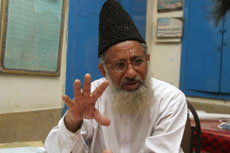|
Pakistan Rejects Linking Madrassahs to Terror
 |
|
"It is important not to pin blame on somebody else when the problem lies internally," said Akram.
|
ISLAMABAD,
July 18, 2005 (IslamOnline.net & News Agencies) – Pakistan has
rejected British accusations that its religious schools (madrassahs)
were to blame for brainwashing London bombers, saying the British
government should look at its own problems and understand the root
causes of terrorism, a Pakistani daily reported on Monday, July 18.
"It
is important not to pin blame on somebody else when the problem lies
internally," English-language The Nation quoted Pakistani
Ambassador to the United Nations Munir Akram as telling the BBC
Radio’s the World this Weekend program.
British
police said four young British-born Muslims, three of them of
Pakistani origin, carried out attacks on three underground trains and
a double-decker bus in London on July 7, killing at least 55 people.
British
Foreign Secretary Jack Straw voiced concern last week that some of the
madrassahs might have terrorist links.
Akram
maintained, however, that his country’s madrassahs were not to blame
for the extremist ideology of the bombers.
"It
is not sufficient for you to just point out that so and so is a
radical in Pakistan. You have them too and we have to address the
problems, the underlying causes."
He
also refuted reports that Shehzad Tanweer, one of the four bombers,
had been turned into a terrorist during a visit earlier this year to a
madrassah in Lahore.
The
Lahore madrassah has denied he ever visited, according to the
Pakistani daily.
Home-grown
Akram
maintained that it was the years spent in Britain that transformed
22-year-old Tanweer into the UK’s first bombers.
He
believes Britain is now a "breeding ground for terrorists
too" and has its own radical preachers and "home-grown
suicide bombers".
The
ambassador said that a particular concern was integrating Muslims into
mainstream British life.
"I
think you have to look at British society, what you are doing to the
Muslim community and why is it that the Muslim community is not
integrating into British society."
British
Muslim scholars have condemned the bombings as "absolutely
un-Islamic", but warned that society needs to fight economic
deprivation and social exclusion, which contributed to extremism.
Backlash
 |
|
"There
are people who are misusing the meaning of 'jihad' and creating a wrong
impression about what the madrassahs do," Naeemi said. (Reuters)
|
Akram
did not deny Pakistan had its own problems with militants which it was
trying to tackle.
"I
accept that Pakistan has to do a lot and we are doing it," he
said.
His
statements came as two of Pakistan's leading religious scholars were
fearful thousands of madrassahs could face a backlash in the aftermath
of the London blasts.
Mufti
Sarfraz Naeemi and Maulana Abdul Rehman Ashrafi, regarded as two of
Pakistan's more moderate scholars, worry the schools will face tighter
controls because a dangerous few misuse the term jihad.
Speaking
to Reuters from one of these madrassahs in Lahore, Naeemi said hatred
and militancy played no part in most schools’ teachings.
"But
there are people who are misusing the meaning of 'jihad' and creating
a wrong impression about what the madrassahs do," he stressed.
Both
scholars believe the London bombs and events like the 9/11 attacks
turned the world against Islam.
Ashrafi
has been to England twice and has found the people there to be very
nice and helpful.
"I
am surprised that such a terrible tragedy should occur in that
country," he said.
He
asserted that his teachings were against any sort of terrorism, and
the courses so intensive that students would have no time for any
extra-curricular militant activities.
Ashrafi
urged the government to root out the people subverting the meaning of
jihad.
Naeemi
blames previous Pakistani governments and the Western powers for
exploiting religion in order to recruit Muslims to fight the Soviet
occupation of Afghanistan in the 1980s.
"The
jihadis of yesterday are today's terrorists. Who is to blame for this
situation?" Naeemi asked.
Writing
in The Guardian on July 11, famed British writer Karen
Armstrong maintained that Islam should not be associated with
terrorist acts committed by people who call themselves Muslims because
they violate essential Islamic principles.
She
also criticized stereotyping the Arabic word "jihad" as
merely meaning holy war, adding that "jihad is a cherished
spiritual value that, for most Muslims, has no connection with
violence."
|